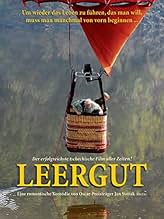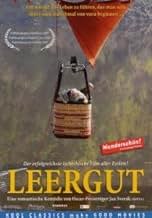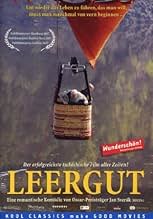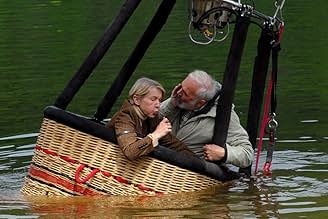Vratné lahve
- 2007
- 1h 44min
CALIFICACIÓN DE IMDb
7.2/10
5.2 k
TU CALIFICACIÓN
Agrega una trama en tu idiomaA comic love story about a man who refuses to accept that old age is empty of love, meaning and value to society.A comic love story about a man who refuses to accept that old age is empty of love, meaning and value to society.A comic love story about a man who refuses to accept that old age is empty of love, meaning and value to society.
- Premios
- 10 premios ganados y 12 nominaciones en total
Tatiana Dyková
- Helenka
- (as Tatiana Vilhelmová)
Nela Boudová
- Ptácková
- (as Nella Boudová)
Opiniones destacadas
Czech filmmaker Jan Sverak takes long breaks in between projects, and this is only his second feature film after the Academy Award winning "Kolya" (1996). Again, the film is a collaboration between Jan Sverak the director, and his father Zdenek Sverak, who returns to deliver another memorable leading role. The older Sverak also wrote the film, which becomes more and more evident as the movie goes on.
Zdenek plays a teacher of literature, who is let go of his job, because he can't connect with the modern generation. Though a man in his 60's, he can't bring himself to stay put at home, where the only thing waiting for him is a dull marriage with his wife, who is a German language home-school tutor. So after trying a few things, Zdenek ends up getting a job at a market, where people return the empty bottles to his counter. This is where the English title "Empties" stems from in a literal sense, though it also references the individuals depicted in the film. The old man dreams of younger women and tries to fight against the bottle returning machine, that threatens to replace him at his job.
What the Sveraks have made for us is a feel good movie, one where things improve slowly but surely. It is not plot-heavy at all, nor does it feel dramatic or strenuous as a viewing experience. It is a film, that works well for older demographics. It is lively, but has nothing too shocking in it. The main character's situation may be melancholy at times, but it's not too brooding. The film goes for both funny, and contemplative moments, and in the end, it's a fairly working mix.
For myself, a younger viewer, it's a little too obvious that the film is written by an older man, who worries about what the younger generation has become. The details of the societal depiction are oft-used almost to a point of being cliches. The opening of the film, where Zdenek's character tries to explain a poem to a class of uncaring millenials sets the scene in a black and white manner, and later, the criticism of technology too is simplified and lacks weight. The film is also very loose and light-weight, as films for older people often are. This means that the political commentary wears off and all you are left with is film, that passes the time nicely, even though it's more amusing than actually funny.
What I liked best about "Vratne lahve" was the market scenes, since they carried this Kaurismäki vibe, that worked well for the narrative. Also the acting is great. The characters played by Zdenek Sverak are always a required taste, but after a while, you find some endearing elements about this protagonist too. The supporting cast is also very good. What I liked least about this film was a quick "Kolya" related fourth wall break, since it took me out of the film emotionally. (Then again, if you compare the societal depictions of the two films, you amaze how much the Czech society has changed in the last few decades, which justifies the feeling of modernity being a burden). Also the last scenes did not really conclude the narrative in a functioning way.
Zdenek plays a teacher of literature, who is let go of his job, because he can't connect with the modern generation. Though a man in his 60's, he can't bring himself to stay put at home, where the only thing waiting for him is a dull marriage with his wife, who is a German language home-school tutor. So after trying a few things, Zdenek ends up getting a job at a market, where people return the empty bottles to his counter. This is where the English title "Empties" stems from in a literal sense, though it also references the individuals depicted in the film. The old man dreams of younger women and tries to fight against the bottle returning machine, that threatens to replace him at his job.
What the Sveraks have made for us is a feel good movie, one where things improve slowly but surely. It is not plot-heavy at all, nor does it feel dramatic or strenuous as a viewing experience. It is a film, that works well for older demographics. It is lively, but has nothing too shocking in it. The main character's situation may be melancholy at times, but it's not too brooding. The film goes for both funny, and contemplative moments, and in the end, it's a fairly working mix.
For myself, a younger viewer, it's a little too obvious that the film is written by an older man, who worries about what the younger generation has become. The details of the societal depiction are oft-used almost to a point of being cliches. The opening of the film, where Zdenek's character tries to explain a poem to a class of uncaring millenials sets the scene in a black and white manner, and later, the criticism of technology too is simplified and lacks weight. The film is also very loose and light-weight, as films for older people often are. This means that the political commentary wears off and all you are left with is film, that passes the time nicely, even though it's more amusing than actually funny.
What I liked best about "Vratne lahve" was the market scenes, since they carried this Kaurismäki vibe, that worked well for the narrative. Also the acting is great. The characters played by Zdenek Sverak are always a required taste, but after a while, you find some endearing elements about this protagonist too. The supporting cast is also very good. What I liked least about this film was a quick "Kolya" related fourth wall break, since it took me out of the film emotionally. (Then again, if you compare the societal depictions of the two films, you amaze how much the Czech society has changed in the last few decades, which justifies the feeling of modernity being a burden). Also the last scenes did not really conclude the narrative in a functioning way.
Vratné lahve (2007), directed by Jan Sverák, written by Zdenek Sverák, was shown in the U.S. with the title "Empties." The title derives from a second "career," undertaken late in life, by the protagonist Josef (Zdenek Sverák). Josef resigns from his position as a teacher and takes a job accepting returned glass bottles at a supermarket. Complications ensue. Josef isn't exactly an ideal worker, but he does establish a rapport with his fellow employees and with some of the customers.
Josef is married, but he and his wife are tired of each other. (Incidentally, his wife is played by Daniela Kolárová, who looks like the Czech Hellen Mirren.) Josef and his wife are both contemplating adultery, although that's not as easy for them as it might sound.
"Empties" is a comedy, but a comedy with a sad and bitter undertone. Everyone is looking for love, romance, and understanding, but mostly they're looking in the wrong places. Still, the film is worth seeing, especially because of the wonderful acting by Zdenek Sverák, who was outstanding in the film "Kolya" ten years ago, and is equally outstanding in "Empties."
Incidentally, the identical names of the actor/writer and director are not coincidental--they are father and son. That must lead to some interesting moments on the set.
We saw this film at the Rochester High Falls International Film Festival. It will work pretty well on a small screen. It's definitely worth seeking out and seeing.
Josef is married, but he and his wife are tired of each other. (Incidentally, his wife is played by Daniela Kolárová, who looks like the Czech Hellen Mirren.) Josef and his wife are both contemplating adultery, although that's not as easy for them as it might sound.
"Empties" is a comedy, but a comedy with a sad and bitter undertone. Everyone is looking for love, romance, and understanding, but mostly they're looking in the wrong places. Still, the film is worth seeing, especially because of the wonderful acting by Zdenek Sverák, who was outstanding in the film "Kolya" ten years ago, and is equally outstanding in "Empties."
Incidentally, the identical names of the actor/writer and director are not coincidental--they are father and son. That must lead to some interesting moments on the set.
We saw this film at the Rochester High Falls International Film Festival. It will work pretty well on a small screen. It's definitely worth seeking out and seeing.
10P-frish
We saw this film when it was first released in Prague, bought the screenplay in Czech, and now own the DVD. This masterpiece from the father-son Sverák team is a gentle low-key story that has appealed here to all ages. It was the most popular movie of the year in terms of theater attendance. The theme is "the search for love" in its very broadest sense, with the sub-theme of the impact of freedom and capitalism on lives in the Czech Republic.
The main character, sixty-five year old Josef Tkaloun, introduces the theme in his classroom of Czech teenagers. In his lesson about a beloved Czech writer, Jaroslav Vrchlicky, he quotes: "For a little love, I would go to the edge of the world bareheaded and barefooted." We follow this theme in his own life and marriage, his daughter's and little grandson's lives, as well as in those of various other characters, young, middle-aged, and elderly, who surround him.
Neither Zdenek Sverák as a writer nor the character of Tkaloun he has written for himself is a judgmental man. Tkaloun's most characteristic response perhaps, is a quiet, "Jo takhle" or "Ah, so that's how it is." Sverák sketches a small world and, within it, gives us a very poignant human story permeated with a feeling of acceptance of all of us in our various weaknesses.
The sub-theme of changes in Czech life since the 1989 revolution may be harder for non-Czech viewers to catch entirely. The local library, for example, has been replaced by a new teeth-whitening business called "Happy Smile." In this one little touch, Czechs will recognize the loss of their public library, the introduction of a strange, expensive, and hitherto unnecessary business, and the current vogue for abandoning Czech for the snobbier, more chic English name.
We also see how the very young, without memories of the "old" days, consider all this as the normal state of affairs, though they realize that their parents or grandparents do not. In a small closely-knit society such as the Czech Republic, relations between generations, whether within the family, at work or school, or in public, have been markedly different in many ways than what one sees in a country such as the U.S. This is now changing with the influx of dubbed television programs, translated popular magazine articles, and advertising. Many youngsters now prefer to go to the mall rather than on the traditional family trip to the countryside, for example. Although most still automatically get up to give their tram or metro seat to an older person, some now ignore this previous mark of well-brought-up behavior.
We should mention, too, that we find the humor delightful. Even on a third viewing we laughed. These performances stand up in the long run.
This movie will definitely be a classic. Thank you Zdenek and Jan Sverák!!!
The main character, sixty-five year old Josef Tkaloun, introduces the theme in his classroom of Czech teenagers. In his lesson about a beloved Czech writer, Jaroslav Vrchlicky, he quotes: "For a little love, I would go to the edge of the world bareheaded and barefooted." We follow this theme in his own life and marriage, his daughter's and little grandson's lives, as well as in those of various other characters, young, middle-aged, and elderly, who surround him.
Neither Zdenek Sverák as a writer nor the character of Tkaloun he has written for himself is a judgmental man. Tkaloun's most characteristic response perhaps, is a quiet, "Jo takhle" or "Ah, so that's how it is." Sverák sketches a small world and, within it, gives us a very poignant human story permeated with a feeling of acceptance of all of us in our various weaknesses.
The sub-theme of changes in Czech life since the 1989 revolution may be harder for non-Czech viewers to catch entirely. The local library, for example, has been replaced by a new teeth-whitening business called "Happy Smile." In this one little touch, Czechs will recognize the loss of their public library, the introduction of a strange, expensive, and hitherto unnecessary business, and the current vogue for abandoning Czech for the snobbier, more chic English name.
We also see how the very young, without memories of the "old" days, consider all this as the normal state of affairs, though they realize that their parents or grandparents do not. In a small closely-knit society such as the Czech Republic, relations between generations, whether within the family, at work or school, or in public, have been markedly different in many ways than what one sees in a country such as the U.S. This is now changing with the influx of dubbed television programs, translated popular magazine articles, and advertising. Many youngsters now prefer to go to the mall rather than on the traditional family trip to the countryside, for example. Although most still automatically get up to give their tram or metro seat to an older person, some now ignore this previous mark of well-brought-up behavior.
We should mention, too, that we find the humor delightful. Even on a third viewing we laughed. These performances stand up in the long run.
This movie will definitely be a classic. Thank you Zdenek and Jan Sverák!!!
9ruuk
Vratné Lahve (written by Zdenek Sverák, directed by Jan Sverák) Father and son. Ten years ago they made film together, it became tremendously successful and won an Oscar. That was Kolya. After that they tried to tell the story of Czech RAF fighters during WW2, which was not so successful, mainly because of the historical, somewhat pathetic theme. Now they are back. After years and years of rewriting the script, son finally accepted his father's work and made it into film, which may be very well theirs best.
Main character Tkaloun (played by Zdenek Sverák) is an nervous, over-aged basic school teacher living with his slowly resigning wife and struggling to find a new way of life for himself after he leaves his teaching job. When he accepts new work in a supermarket as clerk responsible for storing empty glass bottles, he finds (and shows us) that it is never too late for being kind to other people and for life itself.
This film is very funny and moving - in a best way possible. It is also almost ultimately believable, as every scene and every bit of the dialog is taken from life. Audience in the theater started laughing shortly after the beginning and continued throughout the film till the final credits. Everyone was leaving the screening with a great smile on the face, filled with pleasant thoughts.
I don't know when it will hit the theaters abroad or in rest of Europe. But when it does, be sure not to miss it.
9/10
Main character Tkaloun (played by Zdenek Sverák) is an nervous, over-aged basic school teacher living with his slowly resigning wife and struggling to find a new way of life for himself after he leaves his teaching job. When he accepts new work in a supermarket as clerk responsible for storing empty glass bottles, he finds (and shows us) that it is never too late for being kind to other people and for life itself.
This film is very funny and moving - in a best way possible. It is also almost ultimately believable, as every scene and every bit of the dialog is taken from life. Audience in the theater started laughing shortly after the beginning and continued throughout the film till the final credits. Everyone was leaving the screening with a great smile on the face, filled with pleasant thoughts.
I don't know when it will hit the theaters abroad or in rest of Europe. But when it does, be sure not to miss it.
9/10
Empties is a film from the Czech Republic in Czech and German and with English subtitles. The film focuses on a man in his 60's who has just left his teaching job and decides he still wants to work, which leads him eventually to a job as a bottle sorter at a grocery store. At this job because he is very sociable he makes friends with a lot of the customers he has to deal with along with the staff there. The film focuses also on his rocky marriage, his troubled daughter and the many people who come in and out of his life from being involved as a bottle sorter. I really appreciated Empties because of the way it examined and tackled some rather big issues such as a marriage falling apart, working to be useful and as a means of socializing and many of the things that go along with aging. All of these are important parts of this story and at times they are dealt with quite seriously, but the film has tons of wonderful humour in it from it's top notch performances, to the writing and just having the characters be themselves. They are funny because they are so realistically human and everything they say, think and do is not unordinary, or to the extreme and I think many people whether they are a young adult, or perhaps middle aged, or older will find things that they can relate to with this film and because of it's warm hearted humour I think the audience will appreciate such things being analyzed much more and will have a good laugh while watching it. This is not a heavy, or overly sad film. It deals with mature issues, but also has a very humorous and sweet side to it, that you can not help feeling sad for too long, but instead feel moments of tenderness and joy watching the characters and seeing them make their life choices, whether they end up being good, or bad, or perhaps just realistic choices. The film because of it's spirited performances and writing, is very entertaining to watch and out of all the films I have seen so far this year, I think this one will be the most crowd pleasing. The audience I watched this film with, laughed often and really seemed to be enjoying themselves. The humour has a very unique European feel to it and it feels fresh as opposed to all the American comedies that have been out as of late. There are moments when Empties made me think, made me laugh and just kept me in pure enjoyment throughout the film's running time. I think that wherever you are in life, or whatever has happened to you, I think everyone will find something in Empties' story and characters and will have a good laugh and talk about it afterwards. A terrifically feel good and thinking person's movie that has a lot to offer it's teenage and adult audience, so if this is playing anywhere near you, or will be on video soon, I recommend you see Empties. An overall great film.
¿Sabías que…?
- TriviaIn the film there is visible a TV program with a highlighted film Kolya, el nombre de la esperanza (1996), made by the same duo: Jan Sverák (director) and Zdenek Sverák (writer and a main character in both, a father of Jan).
- ErroresEliska is supposed to be a professional teacher of German, yet in the German sentences she speaks in the course of the movie, her German has a heavy Czech accent, much worse than that of her supposed student. And, when Eliska is asked to translate the sentence, "I work for the city administration," her German translation makes no grammatic sense ("an der Stadtamt").
- ConexionesReferenced in Comeback: Lexa a porno (2008)
Selecciones populares
Inicia sesión para calificar y agrega a la lista de videos para obtener recomendaciones personalizadas
- How long is Empties?Con tecnología de Alexa
Detalles
Taquilla
- Total a nivel mundial
- USD 9,864,149
- Tiempo de ejecución1 hora 44 minutos
- Color
- Mezcla de sonido
- Relación de aspecto
- 1.85 : 1
Contribuir a esta página
Sugiere una edición o agrega el contenido que falta

Principales brechas de datos
By what name was Vratné lahve (2007) officially released in Canada in English?
Responda




































